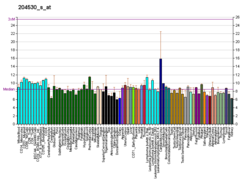
다른 뜻에 대해서는
톡스 문서를 참고하십시오.
TOX(Thymocyte selection-associated high mobility group box protein)는 TOX 유전자에 의해 인코딩되는 인간 단백질이다.[5][6][7] TOX는 T세포 고갈을 몰아붙이며[8][9] 선천 림프세포 발달의 역할을 한다.[10][11]
- ↑ 가 나 다 GRCh38: Ensembl release 89: ENSG00000198846 - 앙상블, May 2017
- ↑ 가 나 다 GRCm38: Ensembl release 89: ENSMUSG00000041272 - 앙상블, May 2017
- ↑ “Human PubMed Reference:”. 《National Center for Biotechnology Information, U.S. National Library of Medicine》.
- ↑ “Mouse PubMed Reference:”. 《National Center for Biotechnology Information, U.S. National Library of Medicine》.
- ↑ Nagase T, Ishikawa K, Suyama M, Kikuno R, Miyajima N, Tanaka A, 외. (October 1998). “Prediction of the coding sequences of unidentified human genes. XI. The complete sequences of 100 new cDNA clones from brain which code for large proteins in vitro”. 《DNA Research》 5 (5): 277–286. doi:10.1093/dnares/5.5.277. PMID 9872452.
- ↑ Wilkinson B, Chen JY, Han P, Rufner KM, Goularte OD, Kaye J (March 2002). “TOX: an HMG box protein implicated in the regulation of thymocyte selection”. 《Nature Immunology》 3 (3): 272–280. doi:10.1038/ni767. PMID 11850626. S2CID 19716719.
- ↑ “Entrez Gene: thymocyte selection-associated high mobility group box gene TOX”.
- ↑ Bordon Y (August 2019). “TOX for tired T cells”. 《Nature Reviews. Immunology》 19 (8): 476. doi:10.1038/s41577-019-0193-9. PMID 31243349.
- ↑ Ando M, Ito M, Srirat T, Kondo T, Yoshimura A (March 2020). “Memory T cell, exhaustion, and tumor immunity”. 《Immunological Medicine》 43 (1): 1–9. doi:10.1080/25785826.2019.1698261. PMID 31822213.
- ↑ Seehus CR, Kaye J (2015). “The Role of TOX in the Development of Innate Lymphoid Cells”. 《Mediators of Inflammation》 2015: 243868. doi:10.1155/2015/243868. PMC 4628649. PMID 26556952.
- ↑ Stokic-Trtica V, Diefenbach A, Klose CS (2020). “NK Cell Development in Times of Innate Lymphoid Cell Diversity”. 《Frontiers in Immunology》 (영어) 11: 813. doi:10.3389/fimmu.2020.00813. PMC 7360798. PMID 32733432.






